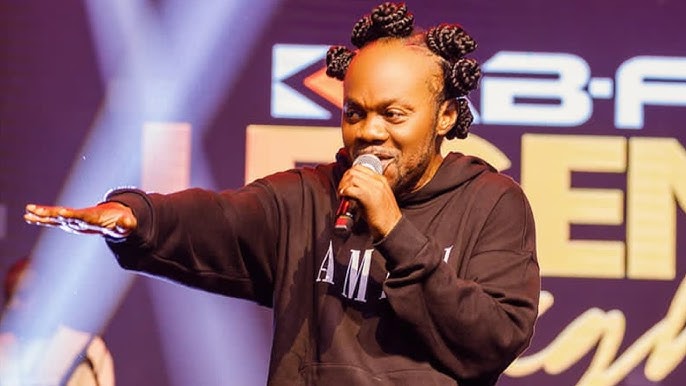His voice still blares from speakers in pubs, lingers in market waves, slips through car windows, and hums through playlists on radio and television, but he lies in silence.
Aben wo aha, but Lumba wɔ aseɛ hɔ.
The fire raged, the dance never stopped, the lyrics still sting with joy and truth, yet today, the voice that made even sorrow sound sweet is quiet.
The man, whose music stitched itself into the very rhythm of our lives, has taken his final bow.
Daddy Lumba, born Charles Kwadwo Fosu, was not just a name, but a mood, a memory, a movement. In a period he had reached over 35 years of setting stages ablaze, he vanished like a final note fading into dusk.
Tonight, a national candlelight vigil is being held at the Independence Square in his memory, with a book of condolence already opened by the family at his radio station, DLFM (106.9 MHz) and residence since last Tuesday.
Just last September, he turned 60, and for the first time, he let us in, not through a song, but through a rare celebration.
He laughed, he waved, he glowed. Maybe, he was saying goodbye.
Now the stage is empty, but the spotlight remains.
The beat may pause, but the legend? He lives on in every note that dares to carry his name.
Though he was one of Ghana’s most celebrated stars, Daddy Lumba remained intensely private.
He rarely granted interviews or courted publicity, choosing instead to let his music speak for him.
In 1998, Gaddy Laryea’s Media Majique and Research Systems, the firm responsible for organising the Miss Ghana Beauty Pageant, went through a herculean task to get him to perform on stage live as part of the event.
It was the very first time Ghanaians would see Daddy Lumba wow his fans in a live stage performance, shattering doubts about his stagecraft.
Emmanuel Krampah, who was the General Manager at Media Whiz Kids, the event organising unit of MMRS, said Daddy Lumba’s Manager at the time, the late Kwasi Brenyah, then of Peace FM, executed the contract.
His quiet nature added to the mystique, making every rare appearance feel like a privilege.
Collective grief
Even in death, Daddy Lumba is bringing people together, not under concert lights this time, but through shared tears and glowing memories.

To the gospel singing trio, Daughters of Glorious Jesus, the connection ran deeper than sound.
“We used to call him our big brother. I recall the days we recorded in the same studio in Germany.
He was soft-spoken, so lovable, so kind.
After studio sessions, we’d go home and eat together; that’s who he was,” said Cynthia Appiadu, the soprano singer of the group.
For Edna Sarpong, also a member of the group, Lumba’s strength lay not just in vocals, but in restraint.
“He was slow to anger, quiet in the face of media noise. He hardly responded; he let the music speak.
The way he strung words together, the way he brought stories to life in songs, it was unmatched,” she said.
And for Monica Owusu Ansah, also a glorious daughter, the void feels even deeper.
“I wish he had left a protégé, someone to carry that torch. When you listen to his gospel songs, you feel it.
Yes, he may not have seemed ‘too churchy’ for some, but the man had a heart for God.
That guy could sing about anything and make you feel everything,” she said.
Gospel act, Diana Asamoah, shared similar sentiments: “Daddy Lumba wasn’t just a highlife legend; he was a man who knew God in his own quiet, personal way.
Gospel act, Diana Asamoah, shared similar sentiments: “Daddy Lumba wasn’t just a highlife legend; he was a man who knew God in his own quiet, personal way.
Flagbearer hopeful of the New Patriotic Party (NPP), Kwabena Agyei Agyapong, spoke from a place of personal loss.
“Daddy Lumba was a national asset.
A friend, a man whose voice comforted us in private pain and public joy.
This one hurts; we didn’t just lose an artiste, I lost a personal friend.”
President John Mahama also joined the national chorus of mourning with a tribute on Facebook.
“Lumba’s unmatched musical genius provided the soundtrack to our lives, carrying us through various phases of life.
The beats to his memorable songs may have died down, but his enduring legacy will echo through the ages.”
Other entertainers such as Sarkodie, Guru, Sista Afia, M.anifest, Pat Thomas and Wendy Shay have also paid glowing tributes, honouring the incredible gift he shared with the world.
Charting immortality
In the days following his passing, Lumba’s music has flooded digital platforms.
On Apple Music Ghana, 30 of his songs entered the Top 100, with Makra Mo shooting straight to No.1.
Best headphones deals
His political anthem, Nana Ye Winner, released ahead of the 2008 elections, boldly stepped into the political space.
Yet, his fan base remained solid, proof of a legacy that transcended party lines.
Daddy Lumba’s true magic was not just in his beat, it was also in his words, his mastery of Asante Twi, laced with wit, proverbs, giving his music unmatched depth.
You didn’t always catch every word. But you felt every meaning.
His songs captured everyday realities from financial struggles (Sika Asem, Ohia Asem) to romantic highs (Se Sumye Kasa, Odo Nti) and even sensual themes (Tokuro Mu, Awooso). Yet, even when he flirted with controversy, he did it with class, never crass.
Lumba also reminded us of faith (Mesom Jesus, Yesu Ka Yen Ho), gratitude (Theresa), and truth (Yentie Obiaa). He was a master of double meaning — Obi Ate Me So Buɔ, Biribi Gyegye Wo and Sesee Wo Se — prove that.
But what struck me most was how he faced death.
He didn’t shy away from it, he sang about it.
Songs like Makra Mo, Yemfa Odo, and Adaka Teaa were his way of writing his own eulogy.
Source: grahic.com.gh



